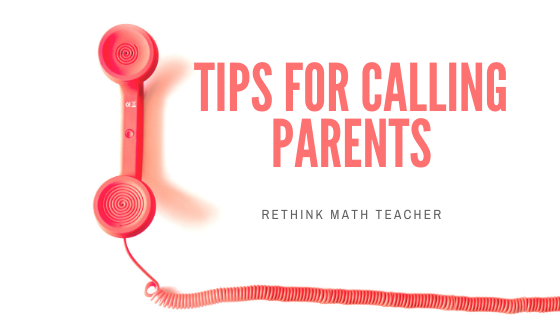
Many teachers avoid calling parents. We’ve probably all had the experience of a ‘less-than-pleasant’ conversation with a mom or dad of a student.
However, phone calls are a very effective way of communicating, and usually, create less hostility and ambiguity than emails. Furthermore, when information must be communicated, it’s good to call so that the parent receives it.
Here are some strategies that will help you have a productive phone call and reduce the likelihood of an incident.
1 – State your name and the school right away
“Hi this is __________ from _________ school”
Not everyone has the school’s phone number, and when you get a call from a number you don’t recognize you are always concerned it’s a spam call. So right away, when calling a parent, let them know who you are and that you’re from the school.
2 – Ask if they are the parent
“I’m looking for Mrs. ___, John’s mom”
Sometimes numbers change or are entered in the system wrong. And sometimes it’s a work number or even a landline and someone else in the house is answering. So don’t assume it’s the parent; ask and make sure. Remember, student information is protected under FERPA laws, so try to make sure you’re staying in compliance by verifying that you are speaking to the parent.
This is why you introduce yourself first, this way they are more likely to let you know if it’s the parent. Otherwise, if you first ask who they are, you might get an off-putting response.
3 – State why you called
“I need to make you aware of an incident that occurred today involving your student today”
It can be nerve-racking to get a phone call from the school. As a parent, you wonder if your student is OK, in trouble, or something worse. So set their mind at ease, and prepare them for the conversation, directly state the purpose of the call upfront.
4 – Ask for a moment of their time
“Do you have two minutes to talk to me?”
This is good manners. But it also helps set proper expectations and makes sure that the parents are available to talk to you. Sometimes, people answer their phones even though they don’t have the ability to talk right now. I will never understand why they do this, but making sure that the parent can talk at this moment will help in the event that they legitimately can’t. It also gives them the opportunity to say, “Yes, give me one moment,” so that they can excuse themselves from the room or situation they are in so that they can talk to you.
5 – Briefly summarize the incident
- Don’t use other students’ names
- Don’t label the child as bad, but that her actions or choices were poor
- Don’t generalize (“he’s always shouting out”)
- Try to be brief with the description
- Give relevant information that will help the parent understand the situation, without making excuses for the student’s decision.
“Today, when I was giving instructions, Billy kept shouting questions out. I asked him several times to stop, but the problem persisted and I had to ask him to do a writing assignment.”
“While doing her group work, Sally and another student began arguing about a movie they had seen. The other student called Sally stupid, so Sally got up and pushed her. Two other students quickly got in between them so that no further altercations ensued, but Sally knows she’s not allowed to push another student.”
“During a test, Juan was talking. I reminded him that if he’s talking during a test, it’s considered cheating and he would get a zero. He told me he didn’t care. So he was sent to the office so the other students could take their test without Juan disrupting the class any further.
6 – Transition to the consequence (if there was one)
“Fernando was told that if he didn’t stop talking he would have a reflective writing assignment, which I gave him in class today. He needs to have it completed and turned in tomorrow.”
“Cursing is not allowed in the classroom and is an automatic detention.”
If a consequence was issued, let the parent know. Don’t shy away from it, be direct. If the parent gives you push back, be prepared to defend the consequence with terminology like, ‘I can’t have my authority challenged in front of the class,’ ‘what he did is not permitted,’ or ‘she was given warnings about her behavior but she chose to continue even though she was aware of the consequences.
Remember that the student’s choice or action is what resulted in the consequence; it’s not you being petty, vindictive, or spiteful. So use language that reinforces that.
7 – Stay committed to your consequence
“Mom, if this behavior is tolerated, what message are we sending to your student and to the rest of the class?”
“I have given Thomas many warnings, they have not proved effective, so now we have to increase the repercussions to try and help him make better choices.”
This is one reason I call home about the first incident and usually don’t give a consequence. I will call the parent, let them know about the poor choice their child made, and ask the parent to intervene (see number 8). When it happens again, and I issue a consequence, the parent will often say it’s unwarranted, and I will rebuttal, “I didn’t issue a consequence on the previous incident, I asked you to intervene, and he’s still making these choices. So now I have to implement a formal consequence.”
Furthermore, once you have issued a consequence, if the parent is able to negate it, you will lose your authority in the eyes of the students. Word will get out that if they get a detention, all they have to do is have their mom complain and it will be revoked. So choose wisely when issuing formal consequences, especially ones that inconvenience the parent, and be prepared to stick to them when you speak with the parent.
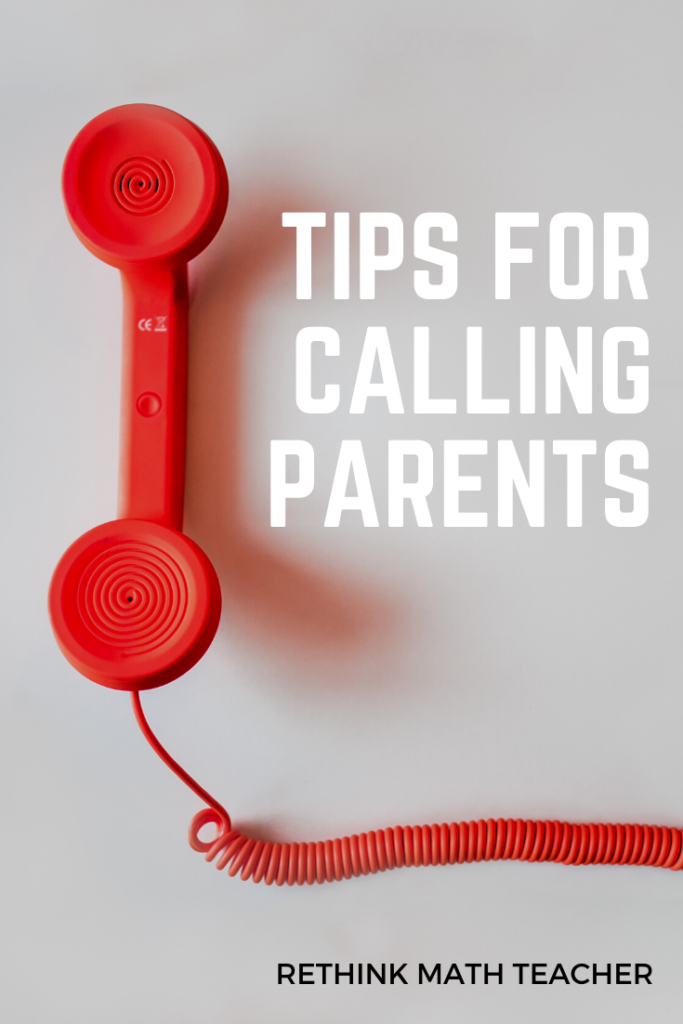
8 – Solicit support from the parent
“Mom, I really need you to have a conversation with Tiffany about better choices she can make when she’s upset.”
“I was hoping you could help me, Jose needs to get this work done or it’s going to hurt his grade. The conversations I’ve had with him have not proven effective. Perhaps you have a way to motivate him to do his work so that he can earn a good grade in the course.”
You want to reestablish that you and the parent have a partnership to help the student be successful and that you are going to work together. Also, this type of phrasing allows the parent with an easy way to respond – helping eliminate their desire to be defensive. It also helps conclude the conversation.
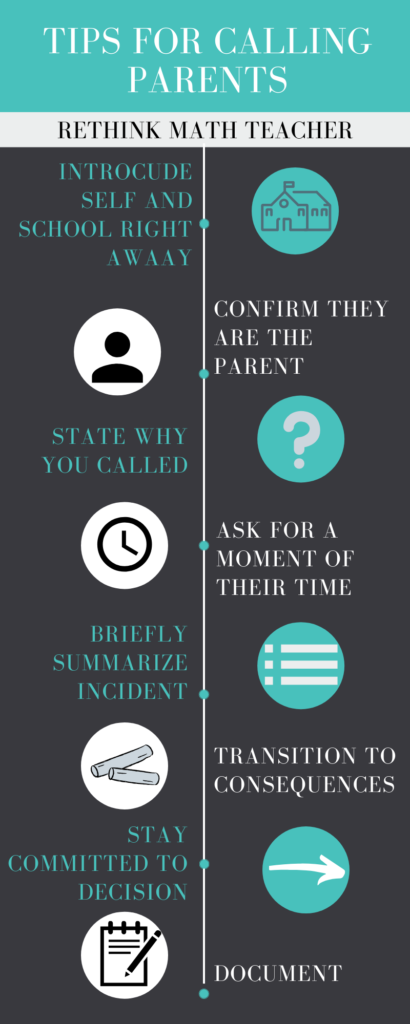
EXAMPLE SCRIPT WHEN CALLING PARENTS
Parent: (answers the phone) “hello?”
Teacher: “Hi, this is Ms. Jones’s from JFK Elementary School, I’m looking for Ms. Peterson, Jordan’s mom.”
Parent: “This is she.”
Teacher: “Hi Ms. Peterson, I need to communicate with you about an incident that occurred at school today involving Jordan, do you have a few minutes to talk to me?”
Parent: “Yes, give me one moment.” (pause). “Okay, I can talk now. Tell me what happened.”
Teacher: “I’m Jordan’s Math teacher, and we were working on a group project. I wasn’t able to hear what caused the incident, but I heard Jordan call another student a derogatory term. The other student was really upset, and had to leave the room because she was crying. So Jordan was given a reflective writing assignment on the power of words, and on it I need him to consider some better ways to express his frustration.”
Parent: “Well what did the other student say that made Jordan react that way?”
Teacher: “You know mom, I wasn’t able to find out. I did ask Jordan, but he wasn’t able to tell me. So I’m going to follow up with both students tomorrow, not only to see if we can get a better understanding of what caused the incident but also so that they can have some resolution. But would you please talk to Jordan, maybe he’ll be able to better explain to you what happened. If he does, please email it to me so that I can have that information when I talk to him. And please, also make sure he does that writing assignment, it is due tomorrow.”
Parent: “I will, thank you for letting me know.”
Teacher: “Thank you for your help, mom.”

This worksheet is FREE when you purchase Taking Control
ADDENDUM
I know that not every conversation goes this well, but if you are to frame things in this light, they are much more likely to go well.
Of course, it also helps if you have already had previous conversations with the parent – especially positive ones. That’s why I encourage you, and all my teachers, to reach out to parents as soon as possible with something positive to say – that way your first contact with the parent is a good one, and your first conversation with the parent about a poor choice their student made is much more likely to be a productive one.
Don’t Forget to Document the Conversation
After you speak to the parent, take a few quick minutes to type up an account of the phone call and save it to your computer – as well as put it in the student records. Be sure to include the date, time, who you spoke to, what number you called, what you spoke about, and the outcome of the conversation.
I like to email the parent afterward, thanking them for talking to me, recapping the outcome, and trying to leave things positively.
“Dear Mr. Smith,
Thank you for talking to me today about Samantha’s behavior. I’m confident with your help she will make improvements. She is very intelligent and has a lot of friends, I would love to see her becoming a positive leader in the classroom. Please remember to sign the detention form that came home and have her bring it to me tomorrow.
Sincerely,”
An email like the one above not only documents the conversation but gives the parent documentation as well (in case they ever say, ‘we never spoke.’)
WHAT NEXT?
If you would like to preview reflective writing worksheets, or purchase some for your class, click here. These reflection worksheets are a free download when you purchase the book: Taking Control of your Classroom Management.
For more strategies and resources on classroom management, check out the book: Taking Control of Your Classroom Management
If you found this article helpful, save it to your Pinterest board or share it on your social media pages with your friends

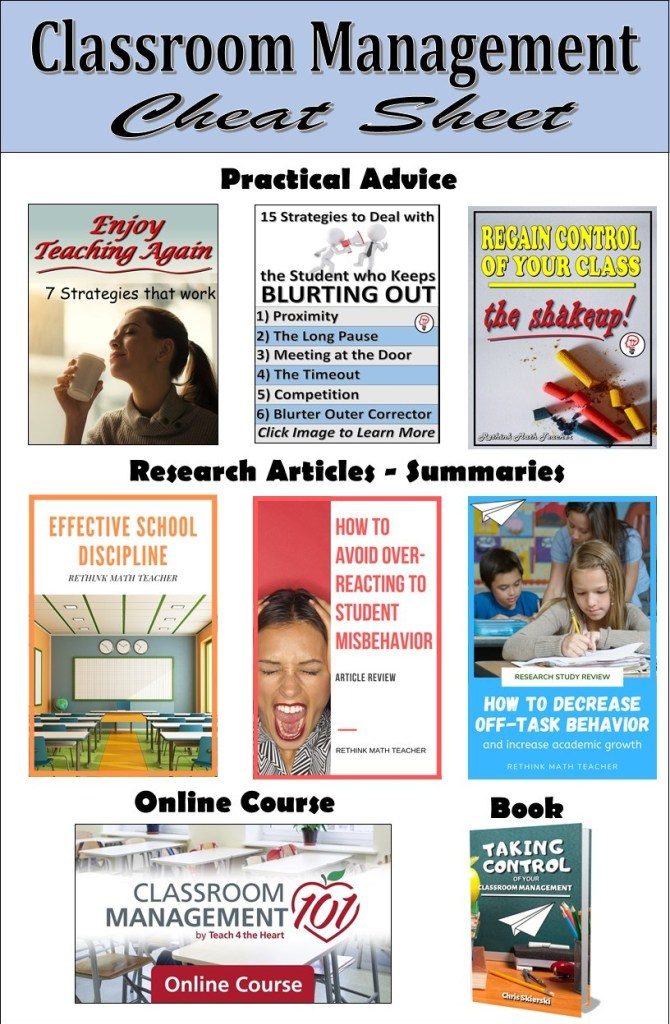



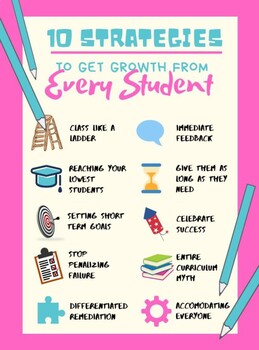

Thank you for these tips. I think most of us do it this way, but I feel that giving extra assignments makes the student feel that assignments are negative. However, a form where the student is asked to answer how to react in a better way next time could be it. That feels more appropriate.